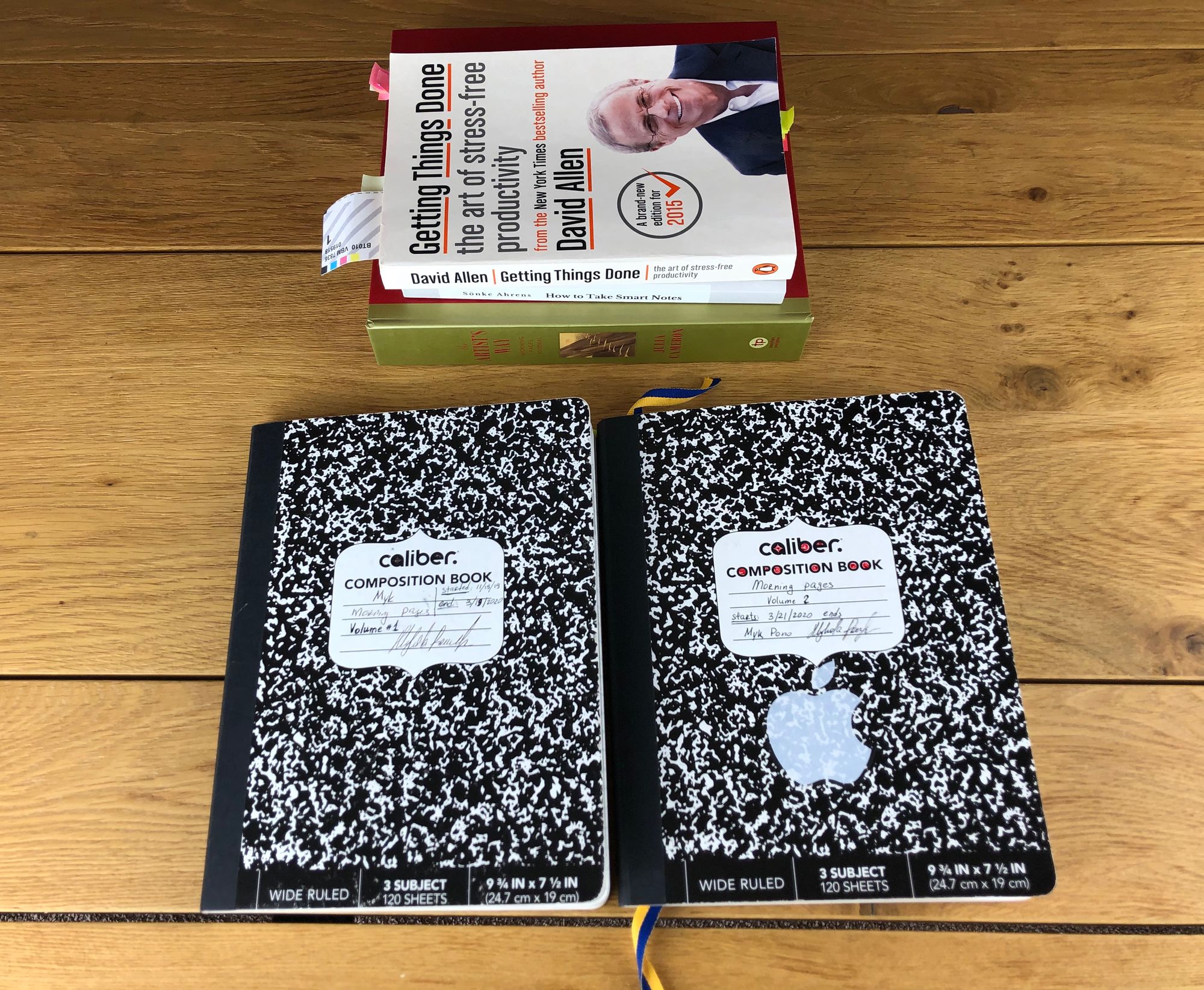The Power of a Weekly Memo: How To Improve Your Productivity and Focus
Writing weekly memos is a powerful habit that will raise your level of thinking and will improve your effectiveness. Your weekly memo is the way to clean your brain from everything that keeps you up at night.

Writing helps us think. When we write something down we translate our abstract ideas into a structured form. When we can’t communicate something clearly in writing, we don’t yet understand it well enough. Writing is the process of thinking.
Last year, I started a habit of writing morning pages. The idea comes from Julia Cameron, the author of The Artist’s Way Workbook. Every morning, before you go about your day, you take about twenty minutes to write three pages in your morning journal. What should you write about? It doesn’t matter, as long as you write three pages without taking your hand off the notebook.
At first, it feels awkward. You write about your dreams, your worries, your thoughts, about previous day’s events, your goals, and aspirations. You just keep writing everything that comes to your mind. Morning pages are not intended to be art or writing. The goal is to clear your mind of lingering thoughts. As Cameron puts it:
“Morning pages are not real writing. They are simply the siphoning off of the mind’s surface so that we can get to the deeper thoughts and impulses that lie beneath our daily voice-over.”
Writing morning pages is a very meditative process. You take the obsessive thoughts out of your mind by putting them on the page. Before the habit is fully formed you may struggle to get to three pages every morning. But after a couple of weeks, it becomes second nature. You will look forward to writing your morning pages because it feels like clearing and calming your ever-noisy mind.
The same is true in our professional lives. We keep multiple projects, initiatives, and goals in mind. And if we don’t write them down they eat into our ability to focus on the present — the task at hand. They cloud our mental operating system. The Getting Things Done (GTD) methodology created by David Allen was designed to enable stress-free productivity. The main idea is to write down your to-do items then use a systematic process for prioritizing and managing them. Similarly, Atul Gawande, in his best selling book Checklist Manifesto, argues that writing things out in a simple checklist not only helps you focus your mental energy on the task at hand but also reduces the number of mistakes and errors you make.
Writing a weekly memo can be another powerful habit to improve your productivity and focus. I started writing a weekly memo a few weeks ago and it has changed everything. It helps me stay focused and communicate better across the organization.
What should you write about in your weekly memos? As with morning pages, your weekly memo is a way to get your pressing items out of your mind and onto the page.
Let me share a few ideas.
Learnings
Did you learn something this week? Every week is an opportunity to learn something, even if it seems small and unimportant. Take note and discuss it in your weekly memo. For example, last week I noted that before I come to a meeting where I want to present an idea or make a decision, I will first try to write an outline of the main points and data that supports it. Use your weekly memo to write about what you have learned this week. Did you talk to your customer and get an important insight? Did you find a better way to manage your meetings? Did you learn something about your team processes that you want to improve? There is always something to learn. By writing down your learnings you not only keep them out of your mind but also feel a sense of accomplishment. This week you have learned something that will help you become 1% better.
Decisions
Did you or your team make decisions this week? A weekly memo is a perfect place to archive and reflect on them. We often forget about the small decisions we make, but if we don’t track those decisions we can’t evaluate their effectiveness. Writing down your decisions is a great habit not only for tracking their effectiveness but also for keeping your team aligned. At the same time, you might have an important decision to make at the next team meeting or on the next quarterly call. A weekly memo is a good place to start summarizing why a decision needs to be made, how it will be implemented, and what we will do to track its effectiveness.
Train your decision process in writing.
Obstacles and Issues
What are the issues and obstacles that keep you up in mind? When we write about our current problems we are forced to prioritize them. Not all problems are worth solving or even need to be solved. Sometimes when you outline a problem in writing you find that this problem isn’t really a problem. Some constraints can be a powerful creativity boost.
Share your challenges in writing.
Focus and Priorities
What were you focusing on last week? What will you be focusing on next week or next month? Reiterating your focus on a weekly basis allows you to review your direction and the direction of your team. You do not necessarily need to adjust your focus every week but even repeating it week after week helps you cement your focus and priorities. After a few weeks of writing a weekly memo, I have updated my growth principles, which I use to communicate to the organization our product growth strategy, how we prioritize, and what is our ultimate goal.
Processes
What processes work well? Which ones need to be changed or reconsidered? Often you feel as if some processes aren’t effective but you don’t have any ideas on how to change them. Maybe your organization isn’t quite ready to adjust a subpar process. Before you can come up with a better process or even before you can convince your team to change it, you need to understand what in the current process isn’t working. Weekly memos are an opportunity to brainstorm and record what’s not working now and why this process should be changed. Weekly memos are the place to document the necessary concerns, data, and arguments. When you feel you have a good case you will bring well-thought-out ideas to your team.
Ideas
Do you have an idea about how to drive more traffic, increase revenue, or improve conversions? Start by outlining your idea in writing. Explain why you think the team should consider it. Is there any data that supports your idea? Use your weekly memo as a personal think tank and discussion board. It takes time to refine an idea and to figure out how to sell it to your organization. Incubate your ideas in your weekly memos.
Writing weekly memos is a powerful habit that will raise your level of thinking and will improve your effectiveness. Your weekly memo is the way to clean your brain from everything that keeps you up at night. It’s a way to practice long term thinking, incubate ideas, improve processes, and contract arguments for important decisions.
Jeff Bezos asks his senior executives to write a six-page memo before every meeting and ask everyone to read it (1). This process provides a shared context to the team for making important decisions. Amazon has long prioritized memos over PowerPoint presentations. Bezos breaks down this process:
“The reason writing a ‘good’ four-page memo is harder than ‘writing’ a 20-page PowerPoint is because the narrative structure of a good memo forces better thought and a better understanding of what’s more important than what.”
Steven Sinofsky summarized the importance of writing perfectly in one of his tweets:
“The act of writing forces the author to think through all the details and steps required to share the lesson. It avoids what happens in business all the time which is “I just know” or “experience” and brings along the team and other job functions on thinking.”
Writing memos also helps you become a more effective communicator, and a better manager and entrepreneur. In the early stages of a venture, a startup founder’s primary job is to communicate with the internal team and external stakeholders the vision — a view of the world that can be. Writing a memo describing what you are building, why you are building it, how, and for whom is a great way to not only convince others to buy into your vision but also to sharpen your understanding of the problem you are trying to address.
Let me leave you with one last tip. Block 30 minutes on your calendar every week for your weekly memo. Thirty minutes is plenty. Also, I found it helpful to schedule these meetings when I’m not under pressure to deliver something or prepare for the next meeting. Friday afternoons are those times for me.
Share with me (on Twitter @mykpono) what else you write in your memos and what you find helpful that wasn’t mentioned.
Related Resources
Books:
- The Artist's Way by Julia Cameron
- Getting Things Done by David Allen and David Kelvin Allen
- How to Take Smart Notes by Sönke Ahrens
- Checklist Manifesto by Atul Gawande
Famous Memos:
- Amazon IPO memo
- Bill Belichick Memo on Football
- The HP Way: Speech by Dave Packard to HP managers (March 8, 1960)
What are some of your favorite memos?
